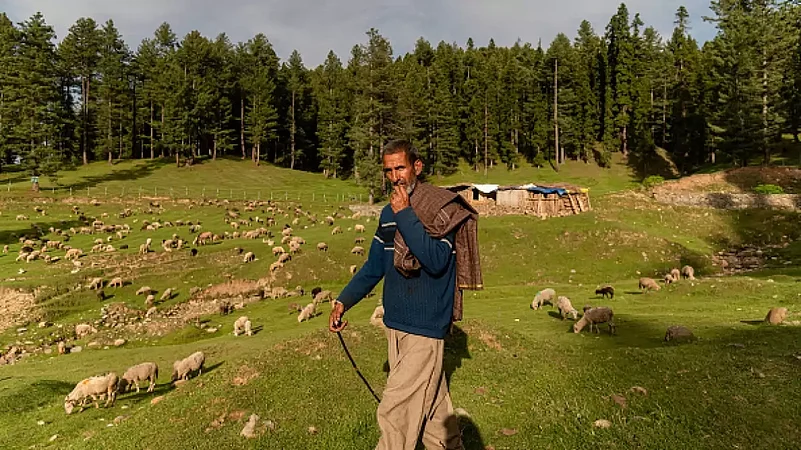For Zahid Parwaz Choudhary, 30, the government's decision to extend the Forest Rights Act 2006 in 2020 was a historical move. Parwaz, who is the president of Gujjar Bakarwal Youth Welfare Conference, an organisation that works among the tribals population of J&K, had petitioned a number of times before the political parties asking them to plead with the centre to extend the law to Jammu and Kashmir as it would help the tribal population of J&K.
“When the law was extended to J&K, we all thought it is a moment of reckoning for all of us and now we will not be pushed out of the forests,” he says.
But three years down the line all excitement has gone. “The law is there but it is not being implemented the way it has been in other states of the country,” says Parwaz.
He says the government is not coming up with figures that how many claims of land rights have been accepted. “I don’t think the number might be encouraging,” he says. Even the community forest rights claims, Parwaz says, are pending with the government. “The Tral area of South Kashmir Gram Sabha, last year recommended four community forest rights claims. The forest department has not cleared it yet. The situation is the same everywhere,” he adds.
“The process is so much slow that it is not taking off,” he adds.
The Scheduled Tribes and Other Traditional Forest Dwellers (Recognition Of Forest Rights) Act, 2006 commonly called the Forest Rights Act (FRA), 2006 recognizes the rights of the forest-dwelling tribal communities and other traditional forest dwellers to forest resources, on which these communities were dependent for a variety of needs, including livelihood, habitation and other socio-cultural needs. Under the FRA, tribals have legal protection against eviction from the forests and they are entitled to other rights including cattle grazing, access to water resources, forest-based livelihood rights and minor forest produce rights. The FRA gives “title rights” to land farmed by tribals or forest dwellers as on December 13, 2005, up to a maximum of four hectares. Jammu and Kashmir have also set 2005 as the cut-off date.
Under the law, Forest Rights Committees (FRCs) have to be constituted at the village, block, and then at the district level, which would then take a call on evictions.
Under the law, if there is a claim submitted by the tribal in respect of the land he is holding, no eviction order can be issued. The claim has to be decided by the three committees and if it is rejected by all three committees then an eviction order can be issued.
“In a recent function that was chaired by the Lt Governor of Jammu and Kashmir Manoj Sinha, the LG himself said the Forest Rights Act’s implementation is very poor in Jammu and Kashmir. This in itself reflects how poor the implementation has been,” says Gujjar leader Chowdhary Zulfkar Ali. Ali, who was Minister in the PDP-BJP government, says the tribals since the law was extended to Jammu and Kashmir, have prepared documentation, visited offices, and sought benefits under the Forest Rights Act. “But I don’t think anyone has got any claim under the FRA so far has been accepted. There is no visible impact,” Ali says.
He says the government and the BJP have been describing the extending of the law to Jammu and Kashmir as one of the benefits of the abrogation of Article 370. “But what we see on the ground is that for the forest department, the forest dwellers continue to be illegal occupants,” he says.
Over the years, different governments in the Centre in spite of Article 370 in place extended scores of central laws to Jammu and Kashmir including National Food Security, the Prevention of Terrorism Act, 2002, the Armed Forces Special Powers Act, 1958 and Goods, and Services Tax Act. However, the centre governments had been reluctant to extend the Forest Rights Act to Jammu and Kashmir due to political reasons as the BJP in Jammu was opposing it and were firm on its opposition to the settlement of the nomadic tribals in the forests.
As per the Census 2011, the Scheduled Tribe comprises more than 14 lakhs of the total 1.25 crore J&K population. The Gujjars and Bakerwals being the largest tribes are concentrated in the Poonch, Rajouri, Dooda, and Reasi districts of Jammu.
In spite of pleas by the political parties and different advocacy groups, the central government didn’t extend the Forest Rights Act to Jammu and Kashmir.
In 2018 the BJP, which was sharing power with the PDP, opposed the extension of the Forest Rights Act in the erstwhile Jammu and Kashmir state while the PDP was keen that the Forest Rights Act that was passed in parliament in 2006 be extended to the state.
Ironically, the BJP would argue it is Article 370 that was saving forests in Jammu and Kashmir and if the central law is implemented in J&K, it would destroy the forests of J&K. While the Centre government extended Forest Rights Act to J&K in October 2020 after 12 months abrogation of Article 370, the tribals leaders and activists say they are still far from getting benefits of the law.
For lawyer and activist Guftar Ahmed Chowdhary, the main problem is that the implementing agency of the Forest Rights Act is the Forest Department. In September last year, Chowdhary called on Lieutenant Governor Manoj Sinha at Raj Bhawan Jammu. He said in the meeting he said that he insisted that the FRA’s implementing agency should be the Tribal Affairs Department. “The awareness about the law within the community is to a large extend fine but the issue is that the community is not getting the rights as given to them by the law,” he says.
Parwaz says elsewhere in the country the nodal agency to implement the law is the Tribal Affairs Department. “Why in J&K the nodal agency is the Forest Department,” he asks.


























